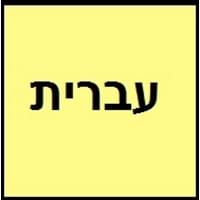Countries
Israel
African Union, Democratic Republic of the Congo, East African Community, Kenya
National Language
Israel
Burundi, Kenya, Madagascar, Malawi, Mozambique, South Sudan, Tanzania
Second Language
Israel
Not spoken in any of the countries
Speaking Continents
Africa, Asia, Europe
Africa
Minority Language
Poland
Not spoken in any of the countries
Regulated By
Academy of the Hebrew Language
Chama cha Kiswahili cha Taifa (Kenya)
Interesting Facts
- The original language of Bible is Hebrew.
- The men and women use different verbs in hebrew language.
- Swahili language has borrowed many words from Arabic language.
- The oldest written scripts in swahili language were found in 18th century.
Similar To
Arabic and Aramaic languages
Burundi, Rwanda, Malawi Languages
Derived From
Aramaic Language
Arabic Language
Alphabets in
Hebrew-Alphabets.jpg#200
Swahili-Alphabets.jpg#200
Writing Direction
Right-To-Left, Horizontal
Not Available
Hello
שלום (Shalom)
Habari
Thank You
תודה (Toda)
Asante
How Are You?
מה שלומך? (ma shlomxa)
Habari gani?
Good Night
לילה טוב (Laila tov)
Usiku mwema
Good Evening
ערב טוב (Erev tov)
Habari za jioni
Good Afternoon
אחר צהריים טובים (Achar tzahara'im tovim)
nzuri Alasiri
Good Morning
בוקר טוב (Boker tov)
Habari za asubuhi
Please
בבקשה (bevekshah)
tafadhali
Sorry
סליחה! (Slicha)
pole
Bye
להתראות (Lehitraot)
bye
I Love You
אני אוהבת אותך (Ani ohevet otcha)
nakupenda
Excuse Me
בבקשה!
Samahani
Dialect 1
Ashkenazi Hebrew
Kiunguja
Where They Speak
Israel
Zanzibar island
Dialect 2
Samaritan Hebrew
Kimrima
Where They Speak
Israel, Palestine
Dar es Salaam
Dialect 3
Yemenite Hebrew
Kimgao
Where They Speak
Israel
Kilwa
Speaking Population
Not Available
Not Available
Second Language Speakers
Not Available
Native Name
עברית / עִבְרִית (ivrit)
Not Available
Alternative Names
Israeli, Ivrit
Kisuaheli, Kiswahili
French Name
hébreu
swahili
German Name
Hebräisch
Swahili
Pronunciation
[(ʔ)ivˈʁit] - [(ʔ)ivˈɾit]
Not Available
Ethnicity
Not Available
Swahili people or Waswahili
Origin
1000 BC
6th century
Language Family
Afro-Asiatic Family
Niger-Congo Family
Subgroup
Semitic
Benue-Congo
Early Forms
Biblical Hebrew, Mishnaic Hebrew, Medieval Hebrew, Hebrew
No early forms
Standard Forms
Modern Hebrew
Swahili
Language Position
Not Available
Signed Forms
Signed Hebrew
Not Available
Scope
Individual
Individual, Macrolanguage
ISO 639 6
Not Available
Not Available
Glottocode
hebr1246
swah1254
Linguasphere
12-AAB-a
99-AUS-m
Language Type
Living
Living
Language Linguistic Typology
Subject-Verb-Object, Verb-Subject-Object
Not Available
Language Morphological Typology
Fusional, Synthetic
Not Available
All Hebrew and Swahili Dialects
Most languages have dialects where each dialect differ from other dialect with respect to grammar and vocabulary. Here you will get to know all Hebrew and Swahili dialects. Various dialects of Hebrew and Swahili language differ in their pronunciations and words. Dialects of Hebrew are spoken in different Hebrew Speaking Countries whereas Swahili Dialects are spoken in different Swahili speaking countries. Also the number of people speaking Hebrew vs Swahili Dialects varies from few thousands to many millions. Some of the Hebrew dialects include: Ashkenazi Hebrew, Samaritan Hebrew. Swahili dialects include: Kiunguja , Kimrima. Also learn about dialects in South American Languages and North American Languages.
Hebrew and Swahili Speaking population
Hebrew and Swahili speaking population is one of the factors based on which Hebrew and Swahili languages can be compared. The total count of Hebrew and Swahili Speaking population in percentage is also given. The percentage of people speaking Hebrew language is Not Available whereas the percentage of people speaking Swahili language is Not Available. When we compare the speaking population of any two languages we get to know which of two languages is more popular. Find more details about how many people speak Hebrew and Swahili on Hebrew vs Swahili where you will get native speakers, speaking population in percentage and native names.
Hebrew and Swahili Language Codes
Hebrew and Swahili language codes are used in those applications where using language names are tedious. Hebrew and Swahili Language Codes include all the international language codes, glottocodes and linguasphere.





